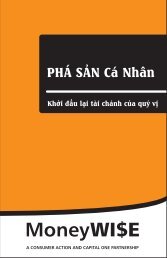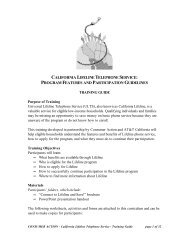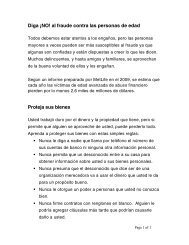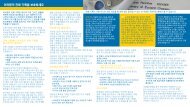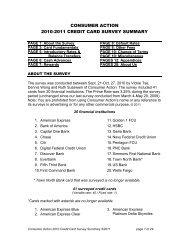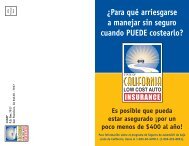Talking to Teens about Money - Seminar Lesson ... - Consumer Action
Talking to Teens about Money - Seminar Lesson ... - Consumer Action
Talking to Teens about Money - Seminar Lesson ... - Consumer Action
You also want an ePaper? Increase the reach of your titles
YUMPU automatically turns print PDFs into web optimized ePapers that Google loves.
A <strong>Money</strong>Wi$e TrainingQuestions <strong>to</strong> generate discussion:• Do even young people have credit reports?—Everyone who has had a credit card or a loan will have a credit report. Butsince most young people do not acquire a credit card until they are 18, only asmall number of younger teens have credit files.• Do you have a right <strong>to</strong> know what is in your credit report?—Federal law gives you the right <strong>to</strong> find out what’s in your file.—Each year, you may request a free report from each of the three major creditreporting companies. To get your free copies, go <strong>to</strong> the Annual Credit Reportweb site (www.annualcreditreport.com) or call 877-322-8228. On the web site,you can apply online and get your report immediately or download an orderform and send it in by mail.• Which companies compile credit reports?—There are three major national credit reporting bureaus that provide “creditreports” <strong>to</strong> lenders and other businesses:• Equifax: 800-685-1111, www.equifax.com• Experian: 888-397-3742, www.experian.com• TransUnion: 800-888-4213, www.transunion.com—There are many other companies that provide “specialty credit reports” forphones, insurance, rentals, etc.• Are there other situations in which you can get a free credit report?—People who are turned down for credit, insurance, a rental, or a job because ofinformation on their credit reports can get a free copy of their credit report fromthe company that supplied the information. Upon request, the company thatdenied you must supply contact information for the credit reporting bureau. Therequest must be made within 60 days.Announce a 15-minute break.Break(15 mins.)Credit Cards(10 mins.)(See “<strong>Talking</strong> <strong>to</strong> <strong>Teens</strong> About <strong>Money</strong>” booklet, page 15-16.)Key points:• Many parents allow their children <strong>to</strong> get a credit card so that they will haveaccess <strong>to</strong> emergency funds.• If moni<strong>to</strong>red carefully, credit cards can be helpful in teaching your childrenhow <strong>to</strong> manage money.• Close <strong>to</strong> two-thirds of college students have at least one credit card.Questions <strong>to</strong> generate discussion:“<strong>Talking</strong> <strong>to</strong> <strong>Teens</strong> About <strong>Money</strong>” — <strong>Money</strong>Wi$e <strong>Lesson</strong> Plan Page 16 of 27


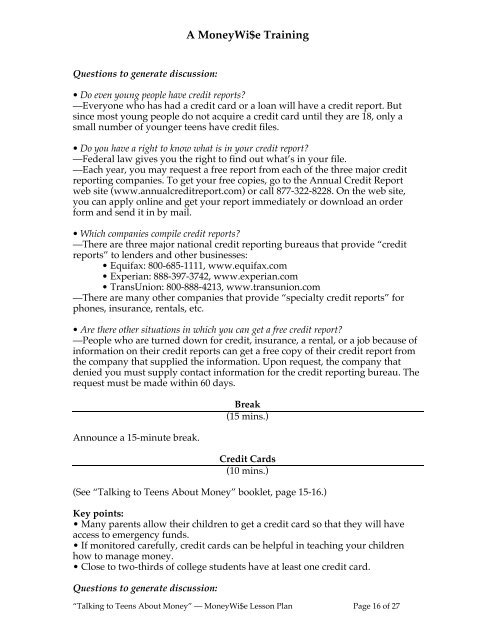
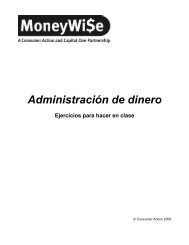

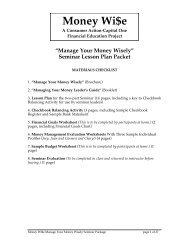
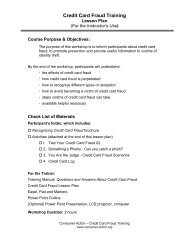
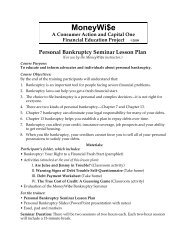
![Debt Collection Issue [Winter 2007-2008] - Consumer Action](https://img.yumpu.com/43405069/1/169x260/debt-collection-issue-winter-2007-2008-consumer-action.jpg?quality=85)
